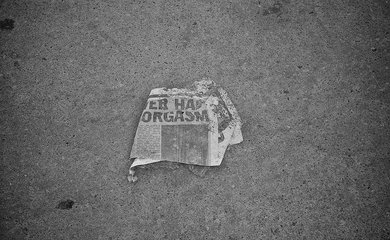Annamarie Jagose, Orgasmology, Duke UP, 2013.
Does orgasm have a history? Queer theorist Annamarie Jagose’s new book attempts to answer this question with a carefully researched journey through the orgasm’s 20th century fortunes, from the the marriage manuals extolling simultaneous orgasm to the vicissitudes of faked orgasm.
Jagose begins by noting the ways in which orgasm is associated with “standardisation and the status quo” in a wide range of theoretical discourses. In particular, Jagose laments the dismissal of orgasm in queer theory as “bound to the regulatory and normalizing aspects of modern sexuality,” a cue queer theory has taken from the work of French theory masters Foucault, Deleuze and Baudrillard. Though this might feel like it is building up to a facile image of orgasm as in some way liberatory, Jagose is playing a rather different game than queer theory transgression-by-numbers. Instead, she insists upon the unpredictability and irregularity of orgasm, tracing the desires, investments and anxieties that produce orgasm as a cultural formation.
As a result, Orgasmology is a somewhat eccentric book. By no means comprehensive, it instead takes a whistle stop tour through the long 20th century of Jagose’s purview. The chapter on marriage manuals and the rise and fall of simultaneous orgasm as both an ideal and a norm for heterosexual marital sex is particularly excellent. Jagose notes the manual’s pedagogical goal in the early part of the century: “to revitalize marriage at a time when the self-evident validity of that institution was being questioned.”
By mid-century though, the simultaneous orgasm began to disappear as a trope of marital bliss, and instead became discredited as an ideal for heterosexuals to strive toward. Jagose notes a through-line between advocates of simultaneous orgasm and their opponents – the assumption that “the ethical project for heterosexual couples depends on feeling normal,” a normality that Jagose argues is grounded in the eternalization of heterosexuality, even as its tropes change over time.
Another stand-out chapter takes on a sorry historical practice – the mid-century behaviour modification programs designed to turn homosexuals straight. Jagose recounts the fascinating details of these experiments, which combined drug and alcohol injections with sensory triggers. Though these experiments were mostly doomed (and hence later rejected by the psychiatric establishment), Jagose sees a queer trace in this “blighted project [which] might offer up, in spite of itself, radical perspectives on sexuality that still struggle to get any effective purchase on everyday understandings of the sexual.”
Jagose asks a series of fascinating, probing questions that behaviourism raises, if never addresses:
What relation does orgasm have to sexual behaviour, for instance? Is itself a sexual behaviour? Or is it rather a means of getting a controlling purchase on sexual behaviour? What relation does orgasm have to erotic orientation? Is it somatic evidence of a particular orientation? Or is it a behaviour that iteratively constitutes orientation? Given the emphasis on erotic fantasy [in behaviour modification programs], what relation does orgasm have to ideation?
In the end, Jagose finds orgasm to be a moving, flowing discourse encompasses multitudes, opposites in unexpected ways. In a chapter looking at faked orgasm as a material practice, Jagose finds it to call into question the very authenticity of sex. Far from the usual recommendations for remedying the practice, Jagose sees it as an “erotic invention that emerges from a set of culturally specific circumstances as a widespread sexual observance, a new disposition or way of managing one’s self in sexual relations.” Neither a sign of women’s sexual repression nor liberation from heterosexual norms, fake orgasm, it seems, is as ambivalent as its “real” counterpart.
It is not all quite so heady – the section on the John Mitchell Cameron movie Shortbus is less than stellar, thwarted perhaps by the unremarkable film it analyzes – but nevertheless, Orgasmology surprises more often than not, questioning queer and straight orthodoxies alike.
More than a niche read for those steeped in the arcane world of queer theory, Orgasmology’s provocative and insistent questioning of the apparently self-evident facts of sex makes it a rewarding read for anyone interested in the history of human sexuality.
Photo by mattjiggins, licensed under a Creative Commons Attribution 2.0 Generic license

